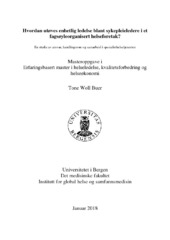| dc.contributor.author | Buer, Tone Woll | en_US |
| dc.date.accessioned | 2018-06-27T09:28:53Z | |
| dc.date.available | 2018-06-27T09:28:53Z | |
| dc.date.issued | 2018-04-17 | |
| dc.date.submitted | 2018-04-17T06:33:38Z | |
| dc.identifier.uri | https://hdl.handle.net/1956/17835 | |
| dc.description.abstract | Background: The Norwegian Specialist Health Care Services Act of 1999 states that hospitals should be organized with one leader at all levels of management. The amendment led to nurses gaining access to apply for executive positions previously reserved for doctors. In 2009, a Norwegian hospital introduced a new organizational model with profession based pillars, where doctors and nurses are parallel leaders and both professions represent multi-level management in the organization. Purpose: This study seeks to illuminate how uniform management is exercised among nurses in the model and if the requirements for unified management are met in accordance with section 3-4 of the Norwegian Specialist Health Services Act. Material: The respondents are current and former leaders at several management levels in the Norwegian specialist health care services. Semi-structured interviews with eleven informants are conducted. The units they manage are different, both in terms of the size of control span and function. The respondents have education backgrounds in nursing, medicine, economics and social science, and with different management experience. Method: The project is based on the qualitative method with a partially structured approach. I have used a phenomenological approach. Results: Nursing leaders manage their own subject area and they have authority to decide on the different levels with some limitations. Controller as a support function helps managers to gain insight and understanding of finances. Leaders prioritize high quality and patient safety and they experience degrees of value conflicts in term of good treatment, care for the individual patient and questions about resources and measurable results. Conclusion: Leaders are responsible for organizing and operating their own unit within budgetary frames. There has been a transfer of power form physicians to nurses as nurses have been given financial responsibilities. New terms have been introduced with New Public Management (NPM) that all leaders must adhere to. The organization is vulnerable in the collaborative areas between the pillars. The lack of representation of nursing leaders at the strategic levels is considered a weakness. | en_US |
| dc.language.iso | nob | eng |
| dc.publisher | The University of Bergen | eng |
| dc.subject | ansvar | eng |
| dc.subject | makt | eng |
| dc.subject | beslutningsmyndighet | eng |
| dc.subject | enhetlig ledelse | eng |
| dc.subject | samarbeid | eng |
| dc.subject | søyleorganisering | eng |
| dc.subject | sykepleieledere | eng |
| dc.subject.mesh | Organization and Administration | eng |
| dc.subject.mesh | Nurse's Role | eng |
| dc.subject.mesh | Power (Psychology) | eng |
| dc.subject.mesh | Economics, Medical | eng |
| dc.title | Hvordan utøves enhetlig ledelse blant sykepleieledere i et fagsøyleorganisert helseforetak? En studie av ansvar, handlingsrom og samarbeid i spesialisthelsetjenesten | en_US |
| dc.title.alternative | How is uniform management conducted among nursing leaders in a pharma-organized hospital? A study of responsibility, freedom of action and cooperation in the specialist health service | eng |
| dc.type | Master thesis | |
| dc.date.updated | 2018-04-17T06:33:38Z | |
| dc.rights.holder | Copyright the Author. All rights reserved | |
| dc.description.degree | Masteroppgave i helseledelse, kvalitetsforbedring og helseøkonomi (EVU) | |
| dc.description.localcode | HELVID650 | |
| dc.description.localcode | MATF-HEVID | |
| dc.subject.nus | 761901 | eng |
| fs.subjectcode | HELVID650 | |
| fs.unitcode | 13-26-0 | |
